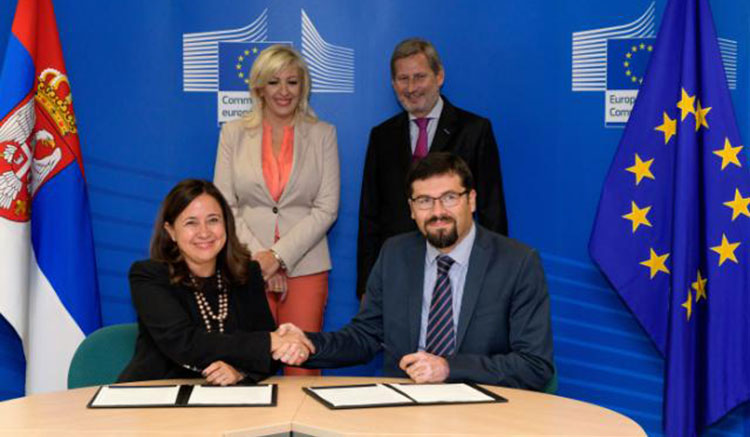The European Union has allocated EUR 27.4 million in grants in support of education reform in Serbia.
“Children in Serbia deserve equal opportunities as the children in the EU,” said European Commissioner for Neighbourhood Policy and Enlargement Negotiations Johannes Hahn following the signature of the sector budget support agreement in the area of education.
The Agreement was signed in Brussels by Director for the Western Balkans of the Directorate General Genoveva Ruiz Calavera and Assistant Minister of European Integration Branko Budimir, in the presence of Serbian Minister of European Integration Jadranka Joksimovic and Commissioner Johannes Hahn.
This is the first Agreement of this sort ever to be signed between the EU and a Western Balkan country.
”Support for education is an essential part of our enlargement agenda. It is an investment in our joint future because Serbia belongs in the European family”, Hahn said during the ceremony.
He said that some 40,000 teachers would be trained according to modern programme and could thus be able to provide students with high quality lectures.
In addition, 4,000 teachers in minority languages will receive special training whereas textbooks for minorities will be published.
Particular attention will be paid to needs of and support for Roma children, 7,000 of whom will be granted scholarships.
Commissioner Hahn said the money would be used for improvement of legal and institutional framework of the education system in Serbia, allowing the youth to receive education that matches labour market needs so as to stay in the country and find employment.
“Today’s Agreement reflects Serbia’s determination and ability to improve its education system as well as EU’s commitment to Serbian citizens,” Hahn said.
Education reform in Serbia – strengthening links with employment and social inclusion
Total budget of EU support for education amounts to EUR 27.4 million for the period 2017-2019.
The overall objective is to assist the Government of Serbia in implementing the reform of the education system, based on the National Education Development Strategy until 2020.
The support aims to improve the quality, equity, and relevance of education and training system, as well as progressively align to European Union standards, policy and practice in order to better match the needs of the labour market, including specific issues linked to education needs of minorities and Roma.
The Agreement will focus on the national qualifications framework and on the teacher training for the implementation of learning outcome-oriented curricula, with the goal to implement measures that will improve student skills and competencies, and their prospects on the labour market.
Also, support will be extended to helping the country meet obligations regarding education in national minority languages and integration of Roma. Support for implementation of measures pertaining to Action Plan for Chapter 23 and the Strategy for social inclusion of Roma 2016-2025 will at the same time increase the coverage of Roma children in the education system and improve the quality of their education.
Specific goals:
- Improving the quality of teaching and learning processes to increase students’ skills and competencies,
- Improving the quality of education in minority languages to increase students’ skills and competencies,
- Improving the coverage of Roma children and students in pre-university education, including reduction of drop-out rates,
- Establishment of a social partnership aimed at linking education with labour market through legal and institutional framework of the National Qualification Framework.




